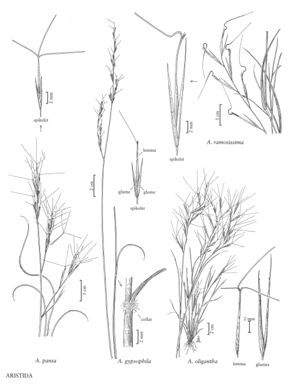Difference between revisions of "Aristida ramosissima"
FNA>Volume Importer |
imported>Volume Importer |
||
| (8 intermediate revisions by 2 users not shown) | |||
| Line 4: | Line 4: | ||
|publications= | |publications= | ||
|common_names=S-curve threeawn | |common_names=S-curve threeawn | ||
| + | |special_status={{Treatment/ID/Special_status | ||
| + | |code=E | ||
| + | |label=Endemic | ||
| + | }} | ||
|basionyms= | |basionyms= | ||
|synonyms={{Treatment/ID/Synonym | |synonyms={{Treatment/ID/Synonym | ||
|name=Aristida ramosissima var. chaseana | |name=Aristida ramosissima var. chaseana | ||
| − | |authority= | + | |authority= |
| + | |rank=variety | ||
}} | }} | ||
|hierarchy=Poaceae;Poaceae subfam. Aristidoideae;Poaceae tribe Aristideae;Aristida;Aristida ramosissima | |hierarchy=Poaceae;Poaceae subfam. Aristidoideae;Poaceae tribe Aristideae;Aristida;Aristida ramosissima | ||
| Line 20: | Line 25: | ||
-->{{Treatment/Body | -->{{Treatment/Body | ||
|distribution=Tenn.;Okla.;Tex.;La.;Mo.;Ohio;Kans.;Ark.;Ill.;Miss.;Ind.;Iowa;Ky. | |distribution=Tenn.;Okla.;Tex.;La.;Mo.;Ohio;Kans.;Ark.;Ill.;Miss.;Ind.;Iowa;Ky. | ||
| − | |discussion=<p>Aristida ramosissima grows in open, dry, sterile ground, fallow fields, and roadsides. It is restricted to the United States.</p> | + | |discussion=<p><i>Aristida ramosissima</i> grows in open, dry, sterile ground, fallow fields, and roadsides. It is restricted to the United States.</p> |
|tables= | |tables= | ||
|references= | |references= | ||
| Line 29: | Line 34: | ||
-->{{#Taxon: | -->{{#Taxon: | ||
name=Aristida ramosissima | name=Aristida ramosissima | ||
| − | |||
|authority=Engelm. ex A. Gray | |authority=Engelm. ex A. Gray | ||
|rank=species | |rank=species | ||
| Line 36: | Line 40: | ||
|basionyms= | |basionyms= | ||
|family=Poaceae | |family=Poaceae | ||
| + | |illustrator=Linda A. Vorobik;Andy Sudkamp | ||
| + | |illustration copyright=Utah State University | ||
|distribution=Tenn.;Okla.;Tex.;La.;Mo.;Ohio;Kans.;Ark.;Ill.;Miss.;Ind.;Iowa;Ky. | |distribution=Tenn.;Okla.;Tex.;La.;Mo.;Ohio;Kans.;Ark.;Ill.;Miss.;Ind.;Iowa;Ky. | ||
|reference=None | |reference=None | ||
|publication title= | |publication title= | ||
|publication year= | |publication year= | ||
| − | |special status= | + | |special status=Endemic |
| − | |source xml=https:// | + | |source xml=https://bitbucket.org/aafc-mbb/fna-data-curation/src/200273ad09963decb8fc72550212de541d86569d/coarse_grained_fna_xml/V25/V25_999.xml |
|subfamily=Poaceae subfam. Aristidoideae | |subfamily=Poaceae subfam. Aristidoideae | ||
|tribe=Poaceae tribe Aristideae | |tribe=Poaceae tribe Aristideae | ||
Latest revision as of 17:59, 11 May 2021
Plants annual. Culms 20-60 cm, wiry. Leaves cauline; sheaths usually shorter than the internodes, mostly glabrous, sparsely hairy near the summit; collars hispidulous, occasionally glabrous; ligules 0.2-0.5 mm; blades 3-22 cm long, to 2 mm wide, flat to involute, glabrous abaxially, sparsely pilose adaxially, without a prominent midrib but with a thickened vein near each margin, pale to gray-green, sometimes slightly glaucous. Inflorescences paniculate or racemose, 5-12 cm long, 2-4 cm wide; primary branches barely developed. Spikelets appressed to slightly divergent from the axillary pulvini. Glumes subequal, apices bifid, awned from the sinuses; lower glumes (9)11-16 mm, 3-7-veined, awns 0.5-2(4) mm; upper glumes 11-18 mm, 1-3-veined, awns 3-7 mm; calluses 0.4-1 mm; lemmas (8)15-20(22) mm, dark, occasionally banded or spotted, apices narrowed but not beaklike; central awns 12-25 mm, bases with a semicircular bend; lateral awns 1-4 mm, erect, occasionally lacking; anthers 3, about 3 mm, brown. Caryopses 9-11 mm, dark brown to black. 2n = unknown.
Distribution
Tenn., Okla., Tex., La., Mo., Ohio, Kans., Ark., Ill., Miss., Ind., Iowa, Ky.
Discussion
Aristida ramosissima grows in open, dry, sterile ground, fallow fields, and roadsides. It is restricted to the United States.
Selected References
None.
